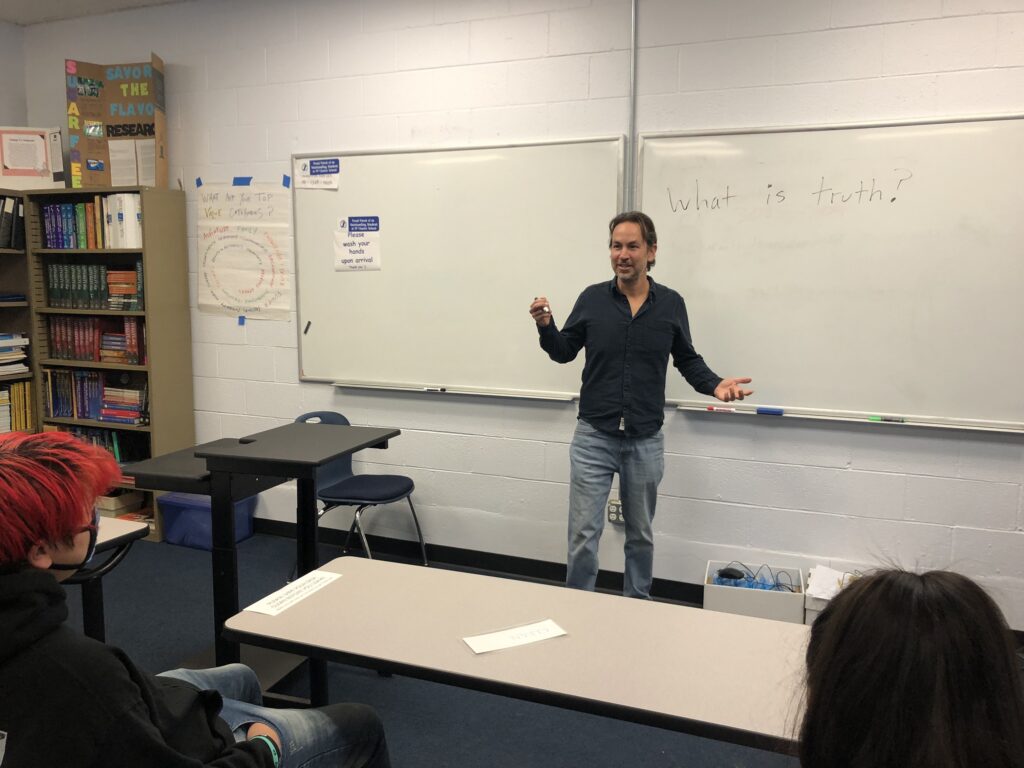 Courtesy: Michael Brajkovich
Courtesy: Michael Brajkovich  Courtesy: Michael Brajkovich
Courtesy: Michael Brajkovich As public school teachers, my colleagues and I spend most of our time educating students and sometimes their families. But here, we’d like to educate our legislators, some of whom have not done their homework.
The topic? AB1316 — a bill in the California Assembly that would close numerous schools and displace literally thousands upon thousands of students and families throughout our state.
Here are a few particulars of the bill that legislators must revise to prevent school closures, student displacement and teacher jobs loss:
- The bill proposes a new funding formula for nonclassroom-based charter schools, also known as NCBs, which compose much of the charter school student enrollment in California. This formula would reduce charter school LCFF/funding by up to 30% depending on how much “classroom-based instruction” takes place. This is devastating because most students and families choose our schools for critical reasons that prevent them from attending in person. However, the bill maintains full funding to students participating in independent study and distance learning in “nonclassroom-based” programs run by school districts and county offices of education; so this proposed funding formula quite blatantly discriminates against charter schools’ independent study/distance learning students.
- The bill also proposes to no longer allow charter schools to enroll out-of-county students who live adjacent to the charter school’s authorizing county unless the charter school already has a previously approved learning facility in that adjacent county. Many nonclassroom-based charters, particularly “online” or “virtual” charter schools do not have those facilities, so those schools would close because much of their student enrollment is from adjacent counties.
- It increases burdens on qualifying vendor/educational partnerships, reducing learning options that provide students with access to professionals and experts in various disciplines and career fields, such as business people, health professionals, environmentalists, farmers, artists and so on.
“Nonclassroom-based charter schools” is a wide umbrella term that includes not only virtual schools where students are able to attend their classes online, but it also includes schools that utilize a variety of instructional models and pedagogies, such as hybrid or blended programs in which students attend a learning center from one to four days per week in addition to meeting one-on-one with their credentialed teacher. It includes a home-schooling model that provides families with a credentialed teacher who serves as a yearlong guide and mentor.
Schools that allow students to engage in a Waldorf learning model, Montessori learning model, progressive learning models, 0utdoor educational model, and project-based learning models also come under this umbrella. In short, nonclassroom-based charter schools demonstrate that one size does not fit all.
Who enrolls in our nonclassroom-based charter schools? While this bill’s language does not really consider who would be severely impacted, you know and love them — they are your sons and daughters, nieces and nephews, grandchildren, cousins, neighbors and friends. They are approximately 200,000 students in our state. They are working students, high-performing students, teen parents, at-risk students, early-graduate students, migrant students, victims of hate crimes, gang-escape students, students with high anxiety and depression, LGBTQ students, college dual-enrollment students and students with various disabilities and various gifts.
While their academic and life needs are varied, they share one thing in common: They need something other than the traditional school model. They need something different and have gone out of their way to choose something different. These students rely on our nonclassroom-based charter schools to get to college, to get through high school, to get through the day.
But if AB1316 passes in its current form, many of these students and families will be displaced.
Their schools — our schools — would close because this bill treats them as “less than” a student in a traditional school model. Our schools would close because this bill penalizes families for choosing the nearest school that meets their needs but happens to be in a different ZIP code. Our schools would close because the legislators who are elected to represent people over special interests have not looked closely at whom this bill would actually affect most of all: our students.
Assembly members and senators, please do your homework with this one. Understand that this is not a test. It is real.
•••
Michael Brajkovich is a high school teacher at Family Partnership Charter School in Santa Maria. He is a member of the newly emerging California Alliance of Charter Teachers in Unionized Schools (CACTUS) that includes dozens of other teachers.
The opinions in this commentary are those of the author. If you would like to submit a commentary, please review our guidelines and contact us.
To get more reports like this one, click here to sign up for EdSource’s no-cost daily email on latest developments in education.


Comments (6)
Comments Policy
We welcome your comments. All comments are moderated for civility, relevance and other considerations. Click here for EdSource's Comments Policy.
Jim 2 years ago2 years ago
If O’Donnell’s name is on it you can be sure sure it’s bought and paid for by the CTA.
Alis Aleman 2 years ago2 years ago
Familias Empoderadas is ready to support with what is better for our students. Definitely District Schools are not working but spending billions of dollars. Our students do not deserve to be limited by zip codes in school systems that don’t work anymore.
Mark Gauthier 2 years ago2 years ago
The author, and the charter school industry, try to paint a bleak picture of life after AB 1316, but ignores the fact that lack of oversight and accountability to California taxpayers has led to mishandling and misuse of monies intended for schools and students since charter schools opened. While public schools operate within strict guidelines and regulations set by the legislature and perform with equal success while serving a more diverse population, charter school operators … Read More
The author, and the charter school industry, try to paint a bleak picture of life after AB 1316, but ignores the fact that lack of oversight and accountability to California taxpayers has led to mishandling and misuse of monies intended for schools and students since charter schools opened. While public schools operate within strict guidelines and regulations set by the legislature and perform with equal success while serving a more diverse population, charter school operators have been allowed to conduct business in the dark, falsifying records and misappropriating funds.
AB 1316 brings charter school operations into the light, making them accountable to our elected representatives and ultimately to the taxpayers who are not going to stand for more corruption in charter school operations. Any ethical charter school organization will succeed under the increased oversight provided by AB 1316, and should welcome the increased vigilance this overdue legislation provides.
Replies
Jim Rustle 2 years ago2 years ago
"increased oversight and accountability" translates into massive reductions in charter school enrollment and funding? What a joke. The bill had the only non-union organization (the San Diego DA office) walk away from the bill because it is such a blatant attack on school choice. It's no wonder the only support the bill has now is union organizations who stand to benefit from the students they will force back into failing schools. Parent choice be damned. … Read More
“increased oversight and accountability” translates into massive reductions in charter school enrollment and funding? What a joke. The bill had the only non-union organization (the San Diego DA office) walk away from the bill because it is such a blatant attack on school choice. It’s no wonder the only support the bill has now is union organizations who stand to benefit from the students they will force back into failing schools. Parent choice be damned.
Covid laid bare exactly how dysfunctional the brick and mortar public school system is. Now the only organizations (non-classroom based charters) that successfully served students remotely (because they are literally built on decades of experience doing distance learning) are being targeted by the unions and their Sacramento lackeys like O’Donnell. They are scared to death that parents are going to choose charters after seeing how absolutely horrendous their local schools were during Covid.
Michael Brajkovich 2 years ago2 years ago
Originally, this bill squarely focused on improved financial oversight, but unfortunately, MANY erroneous and reckless features against charters were later added (which is why the San Diego District Attorney’s office withdrew their previous support of this bill).
Fortunately, there is currently a senate bill- SB 593 (authored by Senator Glazer (D)- which does in fact focus on improved financial oversight without attempting to shut down kids’ schools, and that bill is supported by charter advocates such as CCSA.
Luis 2 years ago2 years ago
Close all private schools, where many of the kids of these politicians go. Black and Brown children deserve quality public schools too.